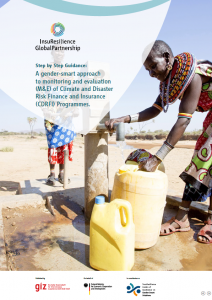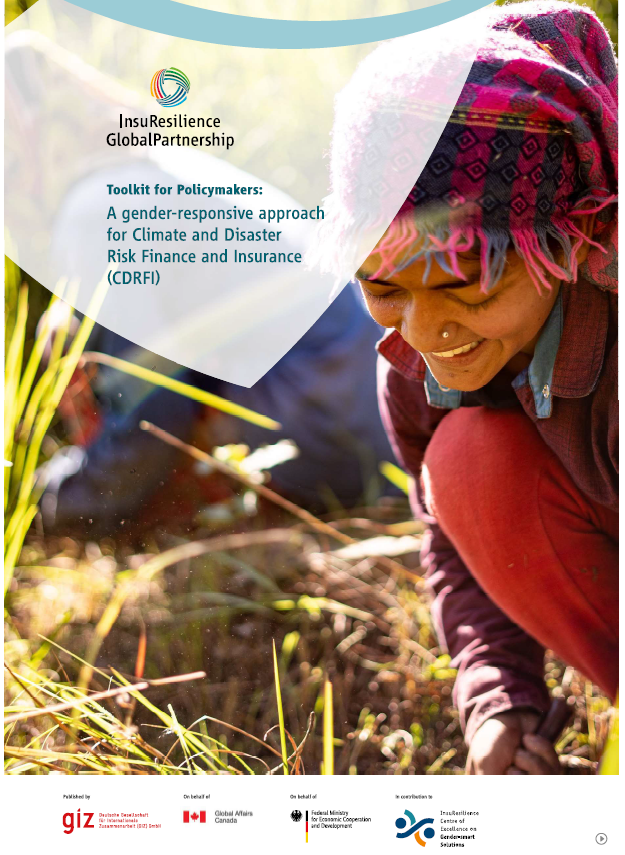Technical Advisory Facility on Gender-smart Solutions

Targeted advice on how to scale up gender-smart Climate and Disaster Risk Finance and Insurance (“CDRFI”) solutions
Gender differences play a crucial role at every step of a climate risk finance project, from vulnerability assessments to stakeholder engagement or the allocation of payouts. Very often, implementers of climate and disaster risk finance and insurance (CDRFI) projects are well aware of the transversal character of gender but lack the know-how and resources to take gender into account in their programme design and implementation.
The InsuResilience Centre of Excellence on Gender-smart Solutions supports implementers of risk finance or insurance solutions in emerging and vulnerable countries in tackling this challenge through technical advisory services – free of charge.
The Technical Advisory Facility offers tailor-made advisory support on different aspects of gender-smart programming.
The key principles of the Technical Advisory Facility approach are:
Demand-driven: Support on specific topics will be offered to organisations that have an expressed interest in investing in and pursuing action related to the specific gender-smart CDRFI solution.
Inclusive: Support will be offered regardless of whether organisations are at a beginner or more advance level of integrating gender-considerations into their work.
Competitive: Support is sponsored but limited and will therefore be offered on a competitive basis to those applicants that demonstrate a need and demand for technical assistance.
Collaborative: Support will be provided in partnership with organisations that will proactively participate in the process and are expected to also invest their own time and human resources in the activities.
Technical: The facility will offer advisory support in areas where it has specialised knowledge and expertise on the theme of gender-smart CDRFI and where it has developed guidance on the topic, such as:
- Gender-smart approaches to Monitoring & Evaluation
- Integrating gender and CDRFI considerations into the policy development process at the national and institutional level
- And applying a gender-lens to CDRFI investments
What is gender-smart Monitoring & Evaluation?Gender considerations are relevant to M&E at all steps within the CDRFI ‘programme life cycle’. It is essential that M&E systems are established at the design stage (i.e., initiating and planning the programme including defining the scope and the theory of change, results framework, and activities) in ways that facilitate the monitoring of gender-differentiated results. The M&E system for CDRFI programmes determines what types of data and qualitative information are needed, collected and how they are analysed and used. The M&E system should facilitate a reflection on who is participating and benefitting from investments in CDRFI, and whether the engagement is promoting equality and equity during the implementation stage (i.e. the execution of programme activities). In turn, the gender-differential impact and potential gender-transformative impact of interventions and/or payouts need to be evaluated during the closure or end of the programme (i.e. to assess medium-term results or outcomes, and impacts). Find our more about gender-smart M&E in this step-by-step guidance note.
|
 |
TOOLKIT FOR POLICYMAKERS: A GENDER-RESPONSIVE APPROACH FOR CLIMATE AND DISASTER RISK FINANCE AND INSURANCE (CDRFI)This toolkit provides a gender-smart Climate and Disaster Risk Financing and Insurance (CDRFI) policy self-assessment framework to identify and analyse the extent to which gender considerations are integrated into your country’s CDRFI-related policies and where there are gaps. This analysis can help you to understand the extent to which gender-based differences in behaviour, risks and vulnerabilities between people are considered within CDRFI-related policies. The findings can assist you to understand gender and CDRF-related policy constraints and enablers and inform recommendations to strengthen the gender-responsiveness of these policies. These recommendations can be drawn on to develop a gender-smart CDRFI action plan. If you work at a regional level, this toolkit will support you to compare gender-smart CDRFI policy actions and gaps between countries at a regional level by aggregating high-level analysis on multiple countries in a given region. Find our more about the toolkit for policymakers.
|
 |

